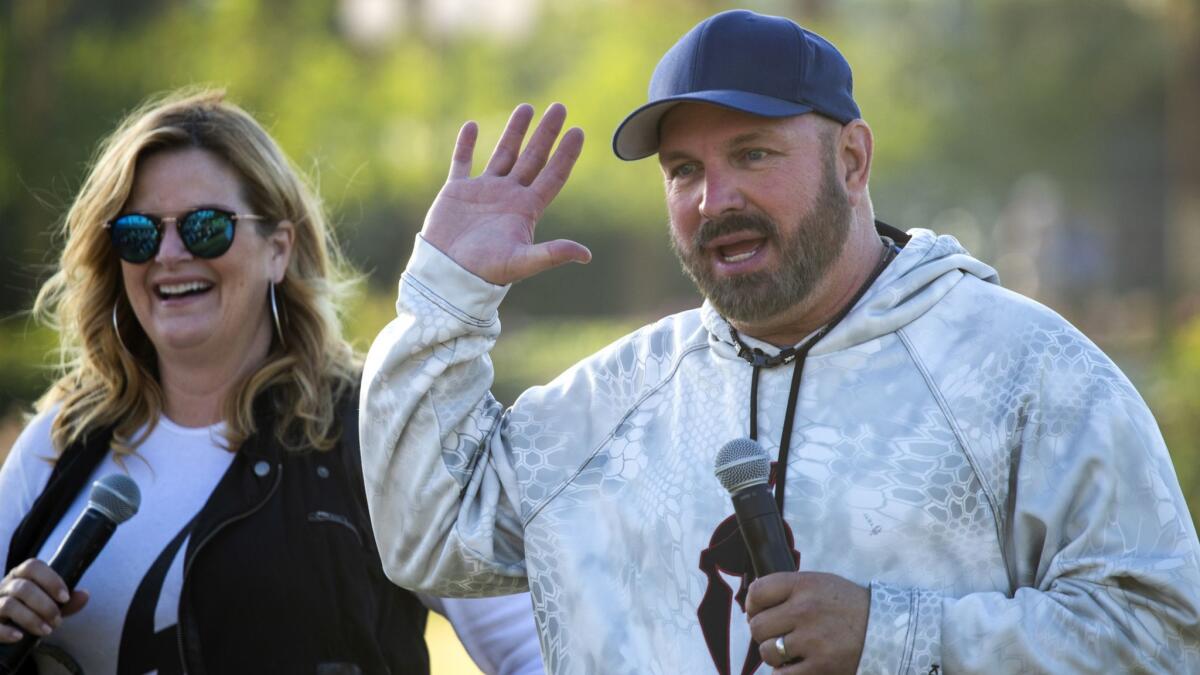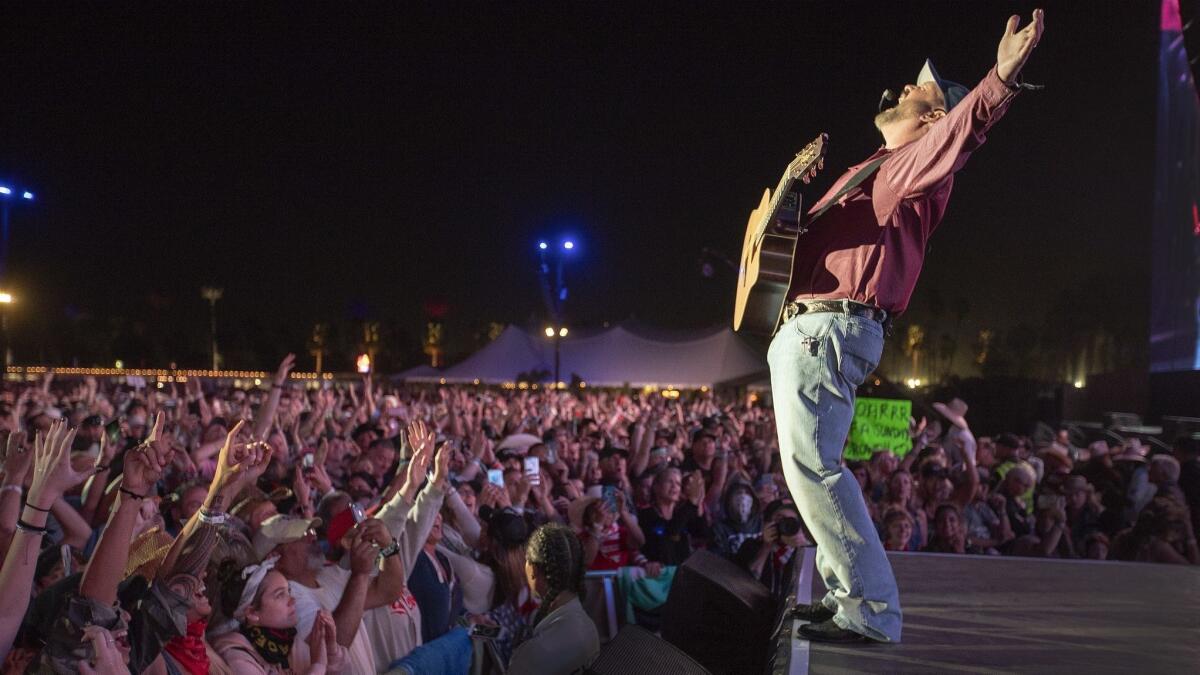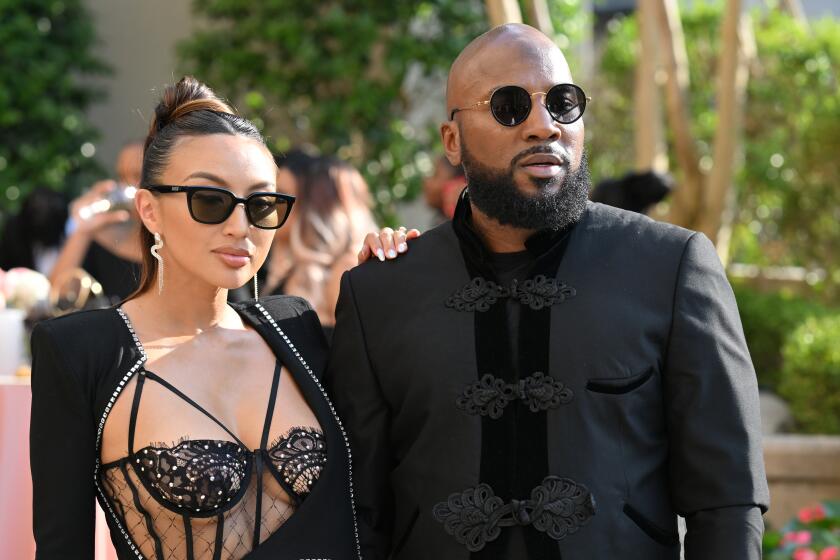Garth Brooks and Trisha Yearwood talk Stagecoach, women in country and setting attendance records

About three hours before taking the stage Sunday night to close out the 2018 edition of the Stagecoach Country Music Festival, Garth Brooks talked about the sense of freedom he was looking forward to in his first appearance at what has become the world’s largest event of its kind since it premiered in 2007.
Since returning to the concert stage in 2014 following more than a decade away while raising his three daughters, Brooks and his wife, singer Trisha Yearwood, have been on an extended tour during which he played for more than 6 million fans in dozens of cities in North America. That, he said, left no opening to accept the annual invitations he said he and Yearwood have received from Stagecoach officials.
“I told them at the very first available time we would play, and this was the first available time,” Brooks said at a news conference preceding his set. “Miss Yearwood played here about 10 years ago and she came home and said, ‘Garth, you have to play Stagecoach.’”
I asked what would be different for him about this show than the others he’s been doing for the last three years. He said it was chiefly the absence of parameters that go with a tightly structured tour performance.
“It’s not choreographed,” Brooks said. “There’s not a specific starting time — you’ve got your schedule, and there’s not any certain rituals you go through every night. To be honest, the start’s the hardest part. Once you get started, it’s great. But just starting is going to be the hardest part.”

Said Yearwood, “When you’re on tour, you’re in a routine: You’ve got your own stage, all your own equipment, you know what’s coming.”
Brooks again picked up the thread. “They could blindfold you and even if you’re wearing boots you can feel it through your feet: You know exactly where you’re at.
“So for this, the main thing is, put yourself in these people’s shoes,” he said. “What did these people come here to do? They came to sing ‘Friends in Low Places.’ They came to hear ‘Callin’ Baton Rouge’ and hear Jimmy Mattingly go off on fiddle. Give ’em the cheese, man, just give them everything they want. It’s back to the same thing: When you start, don’t hesitate, it’s boom and we’re going to kick your ass all night long.”
I also brought up the issue of the dramatic disparity between male and female artists on country radio in recent years. Billboard’s Hot Country Songs chart, which combines radio airplay, sales and streaming activity, is often skewed 8, 9 or 10-to-1 male to female.
I directed my question at Yearwood, who emerged in the 1980s during a time that was far friendlier to women in country, with artists such as herself, Reba McEntire, Patty Loveless, Kathy Mattea, Mary Chapin Carpenter, k.d. lang and numerous others regularly sharing time at the top of the charts with their male peers.
“There’s definitely not as many women on country radio as there should be,” she said. “I have a lot I could say about that, but I won’t. But I think if I could travel around with a PowerPoint about why it’s important [I would].
“I think if the songs are there it shouldn’t matter whether it’s male or female,” she continued. “I think there’s a massive audience for female songs and female artists, not just because I am one and I’m also a fan and I miss it.”
It’s an issue she’ll be facing head on soon given her announcement that she’s now working on her first new album in more than a decade.
“My answer for me is, you put your head down, make music you’re proud of, you work hard and you see what happens. But you never stop pushing; you never stop trying to open those doors. It shouldn’t be that hard. But there’s a lot of things that shouldn’t be that hard; you’ve just got to keep working at it.
“There are a lot of women in country music right now who are a force to be reckoned with. They’re very confident, and they’re not going to give up. I feel proud to come before them and hopefully get a chance to get in there and swing with them a little bit.”
At that point, Brooks took me up on my request that he weigh in on the topic as well.
“I didn’t hear the question: Was this about women in country music, and the lack of them right now? Oh hell, yeah, I want all of this one. Yes.
“I can say this: Boys are stupid, we just are,” Brooks said. “We raised three girls and they’re wonderful, smart and they think here [indicating his heart] before they think with this [forming a fist], which is what we need.
“I miss their voices,” he added. “We have plenty of space for them on country radio. Let’s get the females back here so our format becomes loving and intelligent more than it is now.”
Also at the news conference, Goldenvoice festival talent buyer Stacy Vee, who lines up the performers for Stagecoach each year, said that an all-time record for ticket sales was set Sunday with Brooks’ appearance.
A reporter asked her for the figure.
Vee replied, “75,000,” and subsequently elaborated for The Times, saying that represented “75,000 hard ticket sales. There are probably more than 80,000 people here today” including comp tickets.
Once again, Brooks had the last word: “Who cares how many? It’s a record!”
Follow @RandyLewis2 on Twitter.com
For Classic Rock coverage, join us on Facebook
More to Read
The biggest entertainment stories
Get our big stories about Hollywood, film, television, music, arts, culture and more right in your inbox as soon as they publish.
You may occasionally receive promotional content from the Los Angeles Times.






